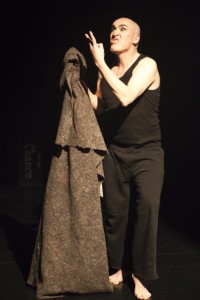VOLUBLE
Once in my earnest youth I dogged a homeless man around lower Manhattan for a whole night, from his steady gig panhandling the car line into the Holland Tunnel through four hours’ can collecting. I was under the influence of undergraduate-level brother’s keeperism and would not be put off by the man’s clear discomfort with my attention. I felt it my duty to Understand the unfortunate. He was not forthcoming. I had to drag the story out of him, a dull story which was, to hear him tell it, hardly worth mentioning: from Hoboken, worked for ConEd, downsized, lost his apartment, crossed the river to new digs under the front steps of the most expensive grocery in SoHo. We ended our conversation there around three in the morning, I asking a lot of leading Whys and What Happeneds, he questioning my motives and progressively clamming up. I’m pretty sure he thought I wanted to have sex with him. I don’t know what I wanted, but I didn’t get it. He didn’t either: having heard that what homeless people really desired was not to be ignored, I was not prepared to give him any money and when he asked me to I did not. I was embarrassed in the presence of such a gauche request. I had talked to him, for chrissake.
 Fishamble’s Irish import production of Pat Kinevane’s monologue Silent, now traipsing its final weekend around the Odyssey, presents a much more outgoing homeless man. Tino McGoldrig (the charming Mr. Kinevane) is the kind of natural raconteur so often and so conveniently found in one-man shows, and is convincingly homeless if one ignores his perfect teeth and politely obsessive cleanliness and inability to become incoherent or belligerent no matter how much he swigs from that bottle or references his history of institutionalization. Mr. Kinevane is an extremely committed actor, possessed of a disciplined body and voice, a talented monologuist with a facility for writing and voicing characters. If his show ends up making not very much dramatic sense or paying heed to its own ideas, it remains enjoyable if not sharp enough to be called poignant.
Fishamble’s Irish import production of Pat Kinevane’s monologue Silent, now traipsing its final weekend around the Odyssey, presents a much more outgoing homeless man. Tino McGoldrig (the charming Mr. Kinevane) is the kind of natural raconteur so often and so conveniently found in one-man shows, and is convincingly homeless if one ignores his perfect teeth and politely obsessive cleanliness and inability to become incoherent or belligerent no matter how much he swigs from that bottle or references his history of institutionalization. Mr. Kinevane is an extremely committed actor, possessed of a disciplined body and voice, a talented monologuist with a facility for writing and voicing characters. If his show ends up making not very much dramatic sense or paying heed to its own ideas, it remains enjoyable if not sharp enough to be called poignant.
Mr. Kinevane possesses a dimpled and beautiful Mephistophelean face, here made up to accentuate a mild resemblance to Rudolph Valentino; in one of the show’s imperfectly-employed conceits, Tino occasionally pantomimes his stories in something like silent film style. Mostly he just talks, and these are Silent‘s best moments, because this actor is a great talker. However, his stylized movements do not always evoke old Hollywood, nor the ballrooms Tino formerly frequented; often they seem essentially modern dancey, born of the life in the arts which the actor but not the character is supposed to have lived. Ah me. Ah well.
 A mostly unremarkable working man from a village in “the rebel county” of Cork, Tino channels his host actor’s passion to tell the sad tale of his journey from solvency to street, of the origins of the guilt that drives him from sanity. Present are the family dysfunction, identity politics, substance abuse, and other familiar elements of Soliloquy Theater. It’s a moving and engaging story despite the audience’s sense that it has heard much of this stuff before, a situation that, anyway, usually annoys me more than it does those sitting around me. Less forgivable is the lackadaisical narrative. I would explain away Tino’s tendency to introduce with a flourish characters never mentioned again (his mother-in-law) as an indication of the character’s addled mind, if the writer didn’t evidence a similar habit of only mentioning once or twice characters supposedly intrinsically important to his dilemma (his aunt, his wife, his son).
A mostly unremarkable working man from a village in “the rebel county” of Cork, Tino channels his host actor’s passion to tell the sad tale of his journey from solvency to street, of the origins of the guilt that drives him from sanity. Present are the family dysfunction, identity politics, substance abuse, and other familiar elements of Soliloquy Theater. It’s a moving and engaging story despite the audience’s sense that it has heard much of this stuff before, a situation that, anyway, usually annoys me more than it does those sitting around me. Less forgivable is the lackadaisical narrative. I would explain away Tino’s tendency to introduce with a flourish characters never mentioned again (his mother-in-law) as an indication of the character’s addled mind, if the writer didn’t evidence a similar habit of only mentioning once or twice characters supposedly intrinsically important to his dilemma (his aunt, his wife, his son).
Jim Culleton’s direction of this show veers from lucid and pretty (lighting technician: Maria Viterelli) to imprecise (Tino’s states of mind, often referred to, are not always delineated in space or in behavior). An extremely late revelation about Tino’s corporeal status, which defies the logic of and makes irrelevant nearly the entire previous action, cannot be blamed on the director except inasmuch as he didn’t talk the writer into something better.
Hereafter be spoilers:
 In a play featuring a tail-end revelation that a character has been dead the whole time, aside from the revelation’s appropriateness to theme and mode it is imperative that all that character’s previous actions be logical to a ghost. This condition is more or less met in Silent except for the fact that Tino interacts with sound effects and props and audience members as if he is alive and we are passersby on the streets of Dublin. This doesn’t really work at the Odyssey since the staging has not created a space in which the audience may do anything but sit; more importantly it doesn’t work, in terms of Tino’s monologue from the afterlife, because the idea that this ghost would keep panhandling after his suicide is a silly one. What this character very clearly wants more than anything is what conventional wisdom tells us all homeless want: not to collect spare change but to be listened to, to tell his story. Tino makes constant reference to being ignored, to pedestrians dropping change into his bowl but only looking at his blanket instead of at him. Well, by the end, if he is in fact dead and under the blanket, then the story he tells of his own funeral is demonstrably false; and if he is not dead but imagines that he is, then the staging should clearly indicate that the character’s reality and ours have parted company. Instead, he tells us that he has been dead with the same earnestness that he tells us everything else. And since he’s supposedly crazy, and death-obsessed, the ambiguity feels unintended and unfortunate.
In a play featuring a tail-end revelation that a character has been dead the whole time, aside from the revelation’s appropriateness to theme and mode it is imperative that all that character’s previous actions be logical to a ghost. This condition is more or less met in Silent except for the fact that Tino interacts with sound effects and props and audience members as if he is alive and we are passersby on the streets of Dublin. This doesn’t really work at the Odyssey since the staging has not created a space in which the audience may do anything but sit; more importantly it doesn’t work, in terms of Tino’s monologue from the afterlife, because the idea that this ghost would keep panhandling after his suicide is a silly one. What this character very clearly wants more than anything is what conventional wisdom tells us all homeless want: not to collect spare change but to be listened to, to tell his story. Tino makes constant reference to being ignored, to pedestrians dropping change into his bowl but only looking at his blanket instead of at him. Well, by the end, if he is in fact dead and under the blanket, then the story he tells of his own funeral is demonstrably false; and if he is not dead but imagines that he is, then the staging should clearly indicate that the character’s reality and ours have parted company. Instead, he tells us that he has been dead with the same earnestness that he tells us everything else. And since he’s supposedly crazy, and death-obsessed, the ambiguity feels unintended and unfortunate.
The theatricality of a presentation ought to be in direct proportion to the requirements of its text. Theatricality cannot defy the needs of that text to inflate its own impact, nor may the text cover its failings with a veneer of theatricality. That my interactions with the real homeless have been less cordial and orderly than those of Tino and his audiences is immaterial. That this production asks its audiences to accept incompatible realities as equally necessary and valid is an oversight not of sociology but of art. If at the end of the evening that can collector of my acquaintance had turned out to be a ghost, then his attempts to ignore me, his going-through-the-motions of habitual business, would have made a sort of thematic sense, especially given my intention to ferret out what he did not wish to give up. But it still wouldn’t be a play.
photos by mariafalconer.co.uk
Silent
Fishamble: The New Play Company
Odyssey Theatre, 2055 S. Sepulveda Blvd.
ends on Sunday, December 16, 2012
for tickets, call 310.477.2055 or visit Odyssey Theatre

